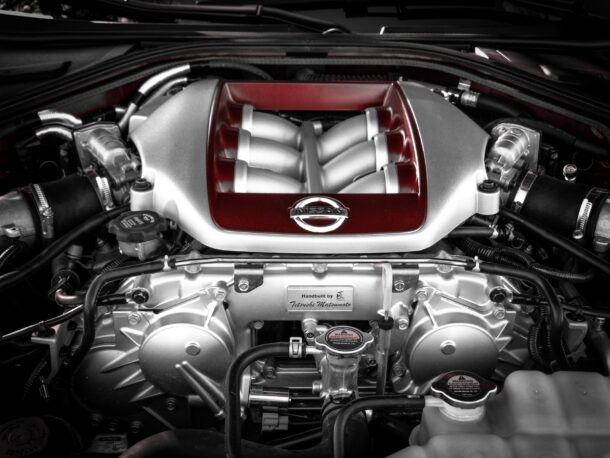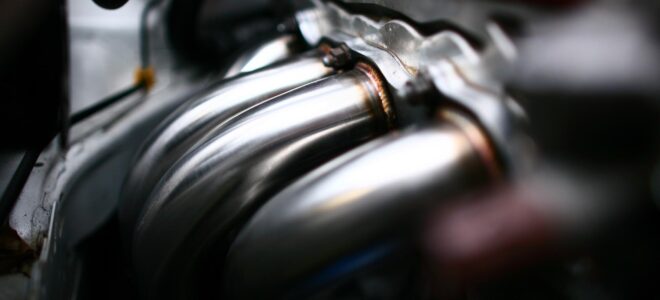The exhaust manifold is part of the truck engine exhaust system. The exhaust manifold is connected to the engine cylinder block to collect the exhaust gas discharged into each cylinder through different pipes. The key to the exhaust manifold is to minimize exhaust resistance and prevent interference between different cylinders. Because when the exhaust gas is excessively concentrated, the cylinders will interfere with each other, which will increase the exhaust resistance, thereby reducing the output power of the engine.
Symptoms of an Exhaust Manifold Leak
Exhaust manifold leakage is an important indication that there may be a problem with your truck. If you do not deal with it in time, the leakage of the exhaust manifold will lead to more serious consequences – serious damage to your engine, or even toxic smoke into the engine room, which will endanger your health. Therefore, you must know the following symptoms of exhaust manifold leakage.
A noisy engine

Source: unsplash.com
A well-functioning exhaust system can suppress the loud noise generated by engine combustion. Therefore, the first and most common sign of any exhaust problem is that the truck engine is noisy. And any part in the manifold that lacks sealing or has cracks will cause this noise to increase sharply. In many cases, a cracked or leaking manifold will emit a “hissing”, “knocking”, “clicking” or “panting” sound. These sounds will be more obvious during a cold start. And the closer to the engine, the louder the sound. If the metal gasket between the manifold and the engine is damaged, exhaust leakage and these sounds may occur. At the same time, the gasket and the exhaust gas undergo thousands of heating and cooling cycles. When gaskets are heated, they expand and contract as they cool. These heating and cooling cycles can put pressure on the gaskets and can cause cracks that can cause leakage in the exhaust manifold. If you find that your truck has the above noise, please consult a professional technician as soon as possible, because this noise also means that your truck is discharging exhaust gas into the air.
Exhaust smells
If you can smell the waste smell in the truck when the windows are open, it may also mean that the exhaust manifold of your truck is leaking. This is a very obvious symptom and the most dangerous. We should know that the exhaust system is responsible for cooling and purifying harmful gases leaving the combustion system. The exhaust gas should flow through the exhaust system and be led away from the vehicle after being treated by the exhaust system. Any leakage of the exhaust system may cause exhaust gases to be drawn into the vehicle rather than discharged. When these exhaust gases are released into the truck, a large amount of heat from the exhaust gases may cause serious damage and premature wear to other parts of the engine. On the other hand, it needs to be known that the leakage of the exhaust manifold will release odorless but harmful carbon monoxide to trucks. When you inhale carbon monoxide, the oxygen in red blood cells will be replaced by carbon monoxide, which will cause serious and lasting, even fatal damage to your body. Therefore, if you feel a headache, weakness, dizziness, or nausea while driving, please pull over immediately and get off immediately to breathe fresh air.
Reduced fuel efficiency
Source: mysfcarguys.com
If you find that you go to the gas station more frequently than before; Or find that you can’t drive so far with a full tank of gasoline as you did last month. In the long run, you may also find that the fuel cost will increase due to the reduced efficiency of truck engines. If the above conditions occur, it can be inferred that your exhaust manifold may be leaking. Leaks will cause the pressure in the exhaust system to decrease. It can trick the oxygen sensor into thinking your engine has a thin mixture. Then, ECU will increase its fuel delivery, resulting in a rich mixture and poor fuel economy. This will have a negative impact on the performance of the truck – the flow of exhaust gas in the truck will slow down and even cause the exhaust gas to flow back. With the exhaust gas flowing back, it will be difficult for your engine to reach the normal power level.
Poor Vehicle acceleration
Leaking exhaust manifolds can have a strange effect on the fuel delivery of your truck, resulting in poor acceleration of your truck. If you find it difficult to accelerate your truck while driving, the exhaust manifold may be leaking. There are also the following situations: First, you may find that your truck gradually or suddenly loses power when accelerating during driving; Second, you may find that your truck is not accelerating as fast as before; Third, you may find that you need to step on the accelerator more to shift gears. All of the above conditions are caused by the poor acceleration of the truck due to leakage of the exhaust manifold. At first, these may be subtle changes, but you will find that the longer you wait to check the truck, the worse the acceleration of the truck. This will make the process of driving a truck more difficult and even more dangerous.
Check engine light

Source: highlandtire.com
A leak in the exhaust manifold can also cause the truck sensor to trigger the engine’s check lamp. Today, most trucks are equipped with oxygen sensors, which can provide key information about the fuel-air ratio of the engine. Usually, the engine will find the problem based on the oxygen sensor readings. Leaks or damage to the exhaust manifold can change the level of oxygen in the exhaust. Then, the ECU of the engine will recognize the error and trigger the check engine lamp. Therefore, you need to pay attention to this signal, which will tell you that there may be a problem with the exhaust manifold. If the situation is very serious, the computer may react by enriching the air/fuel mixture to the point where performance issues such as rough idling or running and misfiring occur.
Conclusion
If your truck has symptoms of exhaust manifold leakage, you need to send the truck to the repair shop for repair immediately, because the leakage of the exhaust manifold will cause carbon monoxide to leak into the vehicle, and you and your family will be exposed to deadly carbon monoxide and other volatile organic compounds and other harmful gases, which are very harmful to human health. Secondly, your truck’s engine may suffer more serious damage – this may cause the exhaust valve to burn, allowing combustion gases to flow back to the intake manifold. The leakage of the exhaust manifold may be caused by gasket failure, bolt failure, or even the manifold itself, which requires a professional inspection. The exhaust system emits combustion odor, strange noise, or other obvious leakage symptoms, which can be found by ordinary people. Therefore, we need to know the above-mentioned symptoms of exhaust manifold leakage to eliminate any exhaust leakage or other difficulties. Remember, the earlier you find problems, the faster you can solve them.




